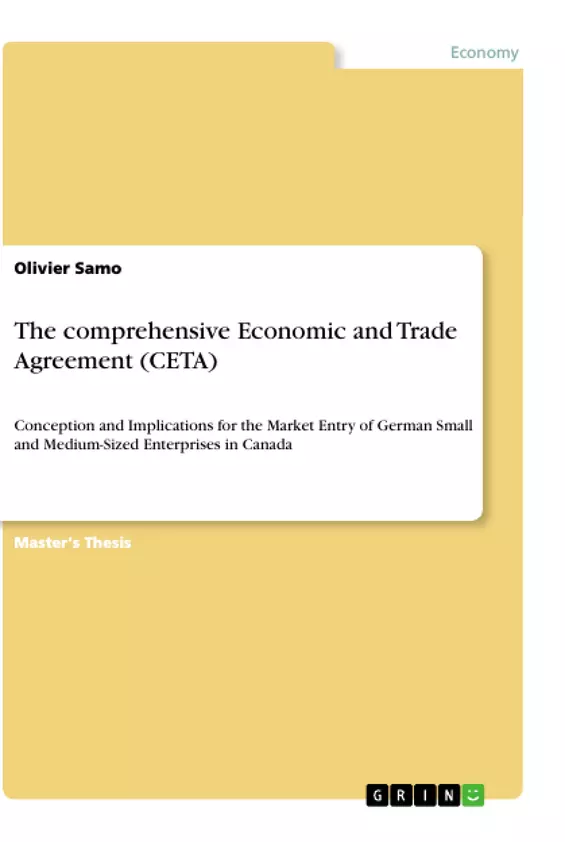This paper introduces the Comprehensive Economic and Trade Agreement (CETA), which is a free trade agreement between the European Union and Canada. The agreement is currently undergoing the ratification process in both jurisdictions. The CETA is aimed at the removal of trade and non-trade barriers and regulatory issues among other things. Some of the topics are highly controversial mainly due to differing standards and norms of both partners. After a thorough introduction of the background of CETA as well as its content, the paper discusses possible impacts of the agreement on the market entry of German SMEs (Small and medium-sized enterprises) in Canada. Opportunities are evaluated for German SMEs. By reading this paper, the reader has the opportunity to inform himself/herself about CETA and to additionally form an opinion on the CETA based on the repercussions that affect German SMEs in the automotive industry presented in this paper. The paper finishes with a conclusion of the most important aspects of CETA
Inhaltsverzeichnis (Table of Contents)
- Introduction
- Definition of the Problem
- Objective of the Thesis
- Methodology
- Small and Medium-Sized Enterprises
- Definition
- Quantitative Criteria
- Qualitative Criteria
- Strengths and weaknesses of SMEs
- The macroeconomic relevance of SMEs
- Internationalization of small and medium-sized Enterprises
- The Trends towards internationalization
- Motives and Objectives of internationalization
- Barriers of internationalization
- International Market Entry Modes
- International activities of German SMEs
- The comprehensive Economic and Trade Agreement
- Structure of the Canada's Economy
- Canada's Economy at Glance
- German-Canadian Trade
- Canada's foreign trade policy and agreements
- Chronology of events and key milestones
- Contents of the Agreement
- Analysis of Impacts of CETA on the Market Entry in Canada for German SMEs
- Exports
- Contractual Agreements
- Foreign Direct Investments
- Conclusion
Zielsetzung und Themenschwerpunkte (Objectives and Key Themes)
This paper examines the Comprehensive Economic and Trade Agreement (CETA), a free trade agreement between the European Union and Canada, and its potential implications for German small and medium-sized enterprises (SMEs) seeking to enter the Canadian market. The study analyzes the agreement's provisions and explores its potential impact on trade, investment, and regulatory issues. The paper aims to provide insights into the opportunities and challenges presented by CETA for German SMEs, particularly those in the automotive industry.
- The impact of CETA on trade barriers and regulatory issues between the EU and Canada
- The opportunities and challenges faced by German SMEs in entering the Canadian market
- The potential impact of CETA on the export activities of German SMEs
- The role of CETA in facilitating contractual agreements and foreign direct investments
- The potential benefits and risks associated with CETA for German SMEs in the automotive industry
Zusammenfassung der Kapitel (Chapter Summaries)
- Introduction: This chapter provides a concise overview of the thesis, outlining the problem statement, objectives, and methodology employed in the research.
- Small and Medium-Sized Enterprises: This chapter delves into the definition of SMEs, examining both quantitative and qualitative criteria for classification. It also explores the strengths and weaknesses of SMEs and their macroeconomic relevance.
- Internationalization of small and medium-sized Enterprises: This chapter focuses on the internationalization of SMEs, exploring trends, motives, objectives, barriers, and entry modes. It also analyzes the international activities of German SMEs.
- The comprehensive Economic and Trade Agreement: This chapter provides an in-depth analysis of CETA, examining its structure, key milestones, and content. It also explores the Canadian economy, German-Canadian trade relations, and Canada's foreign trade policy.
- Analysis of Impacts of CETA on the Market Entry in Canada for German SMEs: This chapter examines the potential impact of CETA on the market entry of German SMEs in Canada. It analyzes the agreement's impact on exports, contractual agreements, and foreign direct investments.
Schlüsselwörter (Keywords)
This paper focuses on the Comprehensive Economic and Trade Agreement (CETA), free trade agreements, internationalization, small and medium-sized enterprises (SMEs), market entry, German SMEs, Canada, automotive industry, exports, contractual agreements, foreign direct investments, trade barriers, regulatory issues, opportunities, and challenges.
Frequently Asked Questions
What is CETA?
CETA stands for the Comprehensive Economic and Trade Agreement, a free trade agreement between the European Union and Canada aimed at removing trade barriers.
How does CETA affect German SMEs?
The paper analyzes impacts on market entry, specifically evaluating opportunities for small and medium-sized enterprises in areas like exports and foreign direct investment.
What are the main barriers to internationalization for SMEs?
Common barriers include regulatory issues, differing standards, and non-trade barriers that CETA aims to mitigate through harmonization.
Which specific industry is highlighted regarding CETA's impact?
The paper focuses on the repercussions of CETA for German SMEs within the automotive industry.
What is the macroeconomic relevance of SMEs?
SMEs are crucial for economic growth and employment; the paper discusses their strengths, weaknesses, and importance in the global trade context.
What are the different international market entry modes for SMEs?
The analysis covers exports, contractual agreements, and foreign direct investments (FDI) as primary modes for entering the Canadian market.
- Arbeit zitieren
- Olivier Samo (Autor:in), 2016, The comprehensive Economic and Trade Agreement (CETA), München, GRIN Verlag, https://www.grin.com/document/966870



